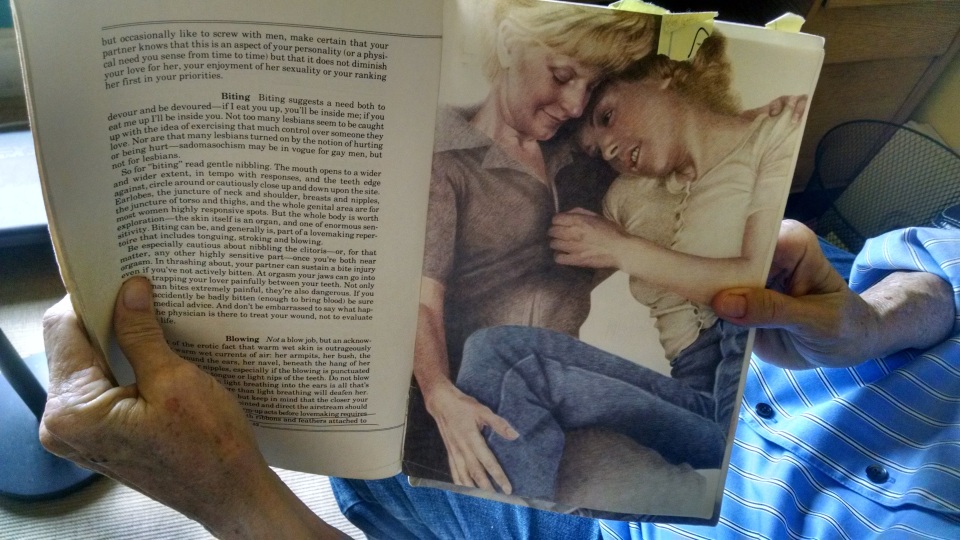The Joke #1: Marilyn Pittman
Manage episode 162660591 series 1262014
We created this podcast to explore the stories behind jokes. Comedians write and perform jokes in a particular time and place and studying the life and death of a joke reveals the short window of time where it is current, edgy, yet appropriate enough to get laughs. A joke is more than just a laugh line, it is a time capsule.
You wouldn’t necessarily think this about Marilyn Pittman’s joke, The Joy of Lesbian Sex, which includes a demonstration of foreplay with a hair dryer, but hear us out….
Marilyn Pittman moved to San Francisco in the 1980’s to become a stand-up comedian. With comics like Robin Williams, Dana Carvey, Ellen DeGeneres and Margaret Cho on stage every night, Pittman refers to 1980’s San Francisco as, “comedy mecca.”
Except it wasn’t the promised land for everyone. Pittman has always been an openly gay performer. She says, despite San Francisco’s identity as a global capital of gay culture, the comedy world was segregated.
There were few openly gay comedians and even fewer opportunities for them to perform in front of mainstream audiences. Even Ellen was in the closet back then.
Pittman says there was pressure to conform to reach a bigger audience, “I would try not to be gay. One time I got up and said ‘my boyfriend’ and it was just not funny. So I kind of realized I was only funny if I was honest.”
Pittman wrote material specific to her experience, but was resigned to performing for gay audiences at fringe clubs.
Then, she discovered a book that would change the course of her career.
While lounging on a Saturday, a friend of Marilyn’s produced the 1978 book, “The Joy of Lesbian Sex,” written by Emily L. Sisley and Bertha Harris. The book is billed as, “a tender and liberated guide to the pleasures and problems of the lesbian lifestyle,” but Pittman knew it was comic gold.
“We start flipping through this book. And we’re just falling over laughing at how ridiculous this book is, and how stupid it is and how goofy and surreal it is.”

(Marilyn Pittman’s copy of, The Joy of Lesbian Sex)
Pittman marked her favorite sections with post-it notes and started bringing the book on stage with her, reading passages and commenting on them. She didn’t have to do much. One of the first lines reads, “Lesbianism in the popular imagination has been a phenomenon somewhat like China. A vast sequestered territory, at once terrifying and inviting, like China there has been a great wall around the lesbian.”
It devolves from there. By the end of Pittman’s act, she’s dancing a jig, acting out instructions on how to please multiple lovers with one’s feet.
Pittman says the joke was especially potent with lesbian audiences because, “lesbians felt paid attention to and felt that they got to have their sexuality talked about and be made fun of by one of them.”
The joke became Pittman’s signature piece, and she performed it to adoring audiences for years, culminating in a 1999 Boston performance in front of thousands.
This performance would be one of the last times Pittman told the joke on stage for several years. What happened?
Two things:
One, after doing it for more than a decade, Pittman got bored of the joke. She says, “I was so glad not to do it anymore! It was like asking someone to do the hit they had 30 years ago, no they want to focus on the new thing!”
Two, Stand up comedy changed. Comedy in the eighties and nineties relied on characters, props, and acts, but a more stripped-down, authentic storytelling became the norm in the early 2000’s. Pittman’s joke felt old and dated.
But something else happened. The rise of openly gay and queer comedians like Ellen DeGeneres and Margaret Cho helped integrate comedy audiences. Pittman had more opportunities to perform for straight audiences and a new demographic to entertain.
She wanted to prove her joke was universal, so she performed The Joy of Lesbian Sex for a mixed crowd at San Francisco’s Purple Onion in the early 2000’s. Pittman says, “They just went crazy! Heterosexual people felt let in and they got to laugh at lesbians, which everyone wants to laugh at lesbians! It’s about time someone made fun of them and who better than me?”
Now, Pittman rarely performs the joke, except every once in awhile as a special request. She’s developing one-woman shows, promoting her book on voice coaching and thinking about what’s next. The Joy of Lesbian Sex is stashed away, but still marked with post it notes, ready to inform crowds.
10 episodes




